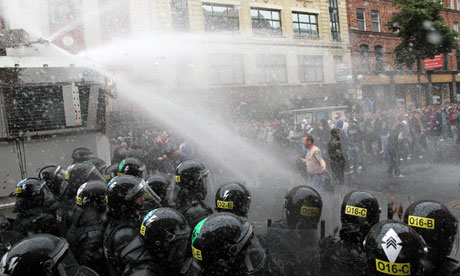Belfast police attacked during clashes with loyalists
PSNI officers in riot shields and body armour bombarded with bricks, stones, fireworks and smoke bombs amid protests
Henry McDonald in Belfast
The Guardian, Friday 9 August 2013 22.57 BST

The PSNI drenched the rioting loyalists with water cannon and used dogs to control the crowds. Photograph: Niall Carson/PA
Belfast's main shopping district was turned into a battlefield last night as thousands of loyalists clashed with riot police to prevent a republican dissident rally passing down the city's main thoroughfare.
The Police Service of Northern Ireland forced a hardline republican alliance, the Anti Internment League, to re-route their march away from Royal Avenue this evening in the face of sustained loyalist violence.
From 6pm to late into the night, PSNI officers in riot shields and body armour were bombarded with bricks, bottles, stones, fireworks, marbles fired from catapults and smoke bombs at the junction of Royal Avenue and North Street – the main route up into the loyalist Shankill Road area.
The PSNI responded by firing baton rounds while using batons to try and clear the loyalist demonstrators off Royal Avenue. They also drenched the rioting loyalists with water cannon and used dogs to control the crowds.
At least two police officers were knocked to the ground on the frontline at North Street, and paramedics spent at least 40 minutes tending to one officer who was later taken away in an ambulance wearing a neck brace.
On the fringes of the riot, a number of extreme loyalists linked to a hard line fundamentalist Protestant preacher threatened several journalists including The Guardian.
While the loyalists set fire to bins and attacked a local pub raiding the bar for pint glasses that they rained on police lines, the PSNI held back the anti-internment republican rally as it entered North Queen Street in the republican New Lodge district. Among those on the march were prominent dissident republicans from organisations aligned to the New IRA.
One of the organisers of the demonstration, Dee Fennell condemned the PSNI for re-routing what he said was a legal march.
"The PSNI have failed to clear the route. They have failed to the clear the protestors in acting illegally in blocking the road. When people like myself have protested previously, blocking the road against loyal order parades, the PSNI had no hesitation in beating us off the road and jailing us. But the PSNI here yet again have shown its one-sided policing," Fennell said.
Eventually the PSNI re-directed the dissident republican march into the nationalist Carrick Hill where there was another stand-off during which a small group of loyalists broke through and exchanged missiles with republican youths. After marshals on the republican side pushed the youths back into their area, the rally was allowed to proceed across into Millfield close to the bottom of the loyalist Lower Shankill area.
As the parade passed through towards the Lower Falls, loyalists were penned back into North Street but continued to shower the marchers and police with missiles.
Several thousand dissident republicans and their supporters along with two bands then marched up the Falls Road to a rally organised to commemorate the 42nd anniversary of the introduction of internment without trial. The march was also seen as a measure of how much support the various factions of dissident republicanism enjoy in nationalist communities in the north of Ireland.
The loyalists meanwhile continued to attack police long after the republicans had crossed from north to west Belfast.
The PSNI later confirmed that they had to fire at least 20 plastic baton rounds to quell the disorder around the centre of Belfast.
PSNI assistant chief constable George Hamilton said "police came under heavy and sustained attack by crowds intent on creating disorder" while facilitating the parades commission's will for the parade and associated protests to take place.
He said that several cars had set alight around the North Street area during the height of the violence. Hamilton added: "As Northern Ireland moves ahead, the effect of tonight's violence has the potential to damage the local economy and the reputation of Belfast as a tourist destination.
"As disturbances are continuing, I would call upon people of influence in communities and those in political leadership to do all possible to reduce tension."
The violence which was still ongoing last night came on the final day of the World Police and Fire Games, which was held for the first time in Northern Ireland over the last seven days. At one point in the clashes between the PSNI and the loyalist rioters, a number of police officers from Russia who had taken part in the games were caught up in the trouble, although none were hurt.
